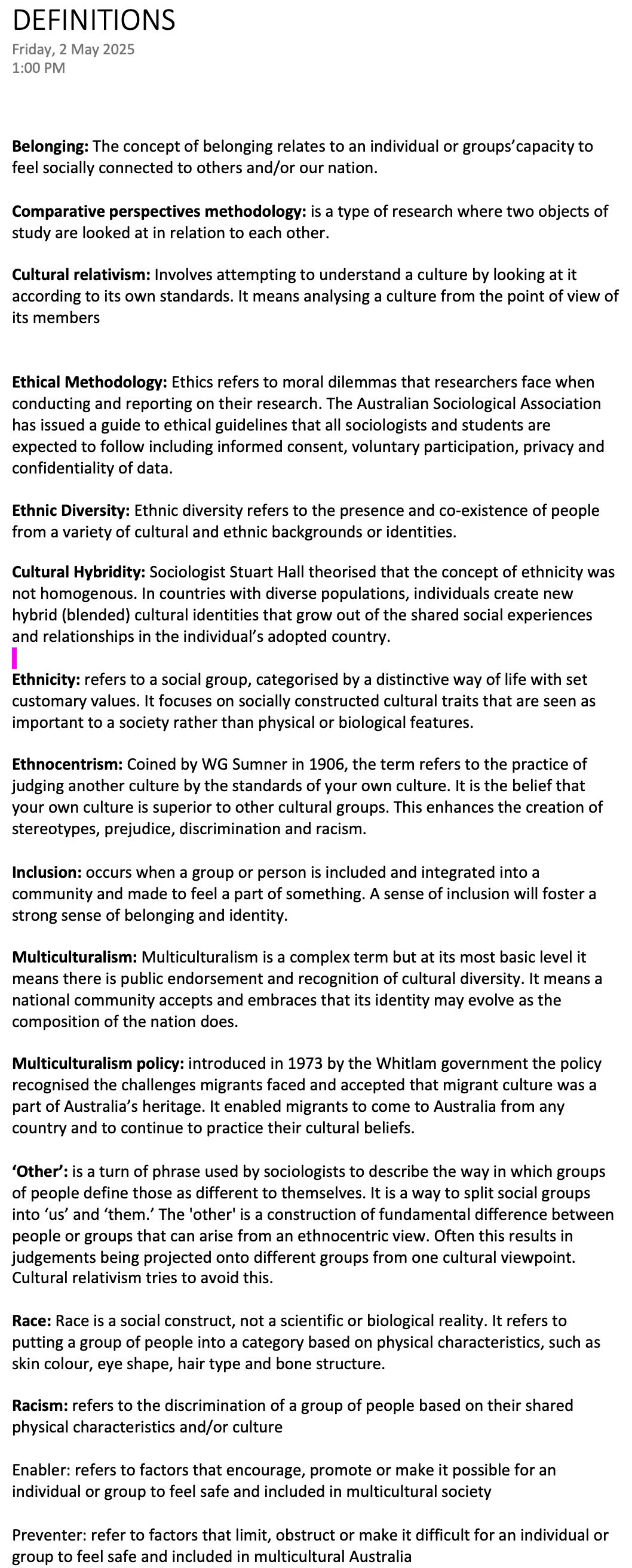Ethnicity Definitions
DEFINITIONS
Friday, 2 May 2025
1:00 PM
Belonging: The concept of belonging relates to an individual or groups’capacity to feel socially connected to others and/or our nation.
Comparative perspectives methodology: is a type of research where two objects of study are looked at in relation to each other.
Cultural relativism: Involves attempting to understand a culture by looking at it according to its own standards. It means analysing a culture from the point of view of its members
Ethical Methodology: Ethics refers to moral dilemmas that researchers face when conducting and reporting on their research. The Australian Sociological Association has issued a guide to ethical guidelines that all sociologists and students are expected to follow including informed consent, voluntary participation, privacy and confidentiality of data.
Ethnic Diversity: Ethnic diversity refers to the presence and co-existence of people from a variety of cultural and ethnic backgrounds or identities.
Cultural Hybridity: Sociologist Stuart Hall theorised that the concept of ethnicity was not homogenous. In countries with diverse populations, individuals create new hybrid (blended) cultural identities that grow out of the shared social experiences and relationships in the individual’s adopted country.
Ethnicity: refers to a social group, categorised by a distinctive way of life with set customary values. It focuses on socially constructed cultural traits that are seen as important to a society rather than physical or biological features.
Ethnocentrism: Coined by WG Sumner in 1906, the term refers to the practice of judging another culture by the standards of your own culture. It is the belief that your own culture is superior to other cultural groups. This enhances the creation of stereotypes, prejudice, discrimination and racism.
Inclusion: occurs when a group or person is included and integrated into a community and made to feel a part of something. A sense of inclusion will foster a strong sense of belonging and identity.
Multiculturalism: Multiculturalism is a complex term but at its most basic level it means there is public endorsement and recognition of cultural diversity. It means a national community accepts and embraces that its identity may evolve as the composition of the nation does.
Multiculturalism policy: introduced in 1973 by the Whitlam government the policy recognised the challenges migrants faced and accepted that migrant culture was a part of Australia’s heritage. It enabled migrants to come to Australia from any country and to continue to practice their cultural beliefs.
‘Other’: is a turn of phrase used by sociologists to describe the way in which groups of people define those as different to themselves. It is a way to split social groups into ‘us’ and ‘them.’ The 'other' is a construction of fundamental difference between people or groups that can arise from an ethnocentric view. Often this results in judgements being projected onto different groups from one cultural viewpoint. Cultural relativism tries to avoid this.
Race: Race is a social construct, not a scientific or biological reality. It refers to putting a group of people into a category based on physical characteristics, such as skin colour, eye shape, hair type and bone structure.
Racism: refers to the discrimination of a group of people based on their shared physical characteristics and/or culture
Enabler: refers to factors that encourage, promote or make it possible for an individual or group to feel safe and included in multicultural society
Preventer: refer to factors that limit, obstruct or make it difficult for an individual or group to feel safe and included in multicultural Australia
